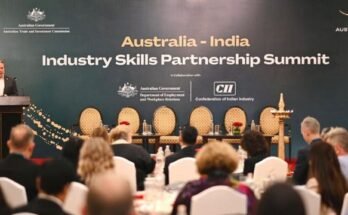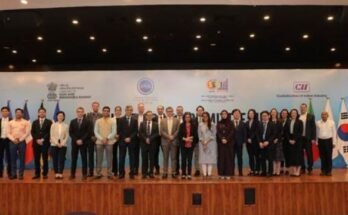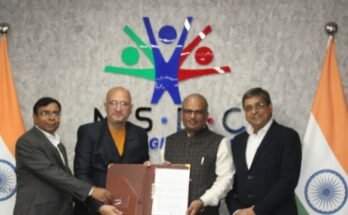Australia has expressed keen interest in broadening its skill engagement with India and working closely with the country to explore innovative and creative ways to realize the potential for increased partnership in the area. “Australia deeply values its close and productive bilateral skills relationship with India and both nations shares much in common with skills collaborations,” Australian education and training minister Simon Birmingham said while addressing a large gathering of high-profile leaders at closing dinner of Australia India Leadership Dialogue 2016 yesterday at MCG.
“As we seek to broaden skills engagement with India, we are eager to collaborate, work closely with industry, the training sector and government, to explore innovative and creative ways to realize the potential for increased skills partnership,” he said.
“We appreciate that with such a young population, India faces both an opportunity and a very formidable challenge to expand the capacity and quality of the skills training sector,” Birmingham said, adding that India’s target of skilling 400 million people by 2022 was impressive, and mind-blowing by Australian standards.
“We are well-placed to work in building India’s capacity to meet its enormous training demand. Australian vocational education is internationally recognized for its unique qualification structure, industry-focused training, all of which lead to high employability outcomes,” he said.
Indian and Australian leaders including Shadow Treasurer Chris Bowen, Assistant Minister to Prime Minister Senator James McGrath, the newly- appointed Indian High Commissioner A M Gondane, Melbourne-based Consul General Manika Jain, former Australia India Institute (AII) Director Amitabh Mattoo and AII director Craig Jeffrey attended the event.
“We have been delighted to see that Australia’s Kangan Institute is working with India’s Government of Gujarat and Maruti Suzuki to build India’s first international Automobile Centre of Excellence,” Birmingham said.
“In a bilateral sense, we’re also doing substantial work with India on the development of international occupational standards to support greater shared understanding of skills and mobility in skills for industry across country borders,” he said.
He said that other approaches to skills training were also being tested to assist in meeting international market needs, such as the international training and assessment courses; an example of the Australian Government and Australian providers working with Indian partners to build the skills and capabilities that vocational education trainers and assessors.
This has been piloted with over 300 learners from eight countries participating. Australia wanted to remain a country of choice for Indian students and aspire to be a partner of choice to India in education sector with a firm focus on opportunities in higher education, scholarship programs, two-way exchange research programs as well as vocational and training courses, Birmingham said.
Highligting on Australia-India education relationship, he said, “We work to ensure that we identify the important issues that are barriers to the participation successfully of students from India who come to Australia, or of training providers from Australia going to India, and importantly are seeking to ensure that we maximize and enhance the two-way flow of students, because it is a true mutual exchange and a building of a better, stronger understanding across our nations,” Birmingham said.
“As Education Minister, I want to focus quickly on a few of the education issues important to our two countries, the strong relationships we have built over time as well as the opportunities for future growth. Our main vehicle for education engagement is the Australia India Education Council, which I am pleased to co-chair with my counterpart, the Honourable Prakash Javadekar, Minister for Human Resources and Development,” he said.
“Through their four working groups, our countries look at areas of higher education and research, qualifications recognition and quality assurance, schools and skills to identify the key areas in which we can work together to achieve goals to the benefit of both our nations,” he added.
The minsiter said that Australia was aspiring to be a partner of choice to India in education, creating the knowledge and opportunities to help both the side become stronger and more prosperous.
“Through opportunities such as this, the Australia-India Leadership Dialogue, we can bring together senior leaders from education, coupled with those from government, industry and business to discuss areas of mutual interest that will enable us to deepen that education cooperation that already exists,” he said.
The minister said in 2015 Australia received around 640,000 students from around the world of which around 10 per cent were from India, making it the second most popular country for arrivals, behind China.
He said that several projects were already in place like University of Western Australia, Punjab University and International Crops Research Institute for the Semi-Arid Tropics were working on a joint project to address the issue of climate stresses on the growth of chickpeas.
India is the world’s largest producer of chickpeas, producing nine million tons.
“India of course also happens to be Australia’s largest chickpea export market, with up to 80 per cent of our one million tonnes exported to India. But chickpea production is being challenged and restricted by salinity and drought, doubly in India because of the intense heat. And this of course is a particular issue where chickpeas are a part of the staple diet,” Birmingham said.
Note: News shared for public awareness with reference from the information provided at online news portals.



